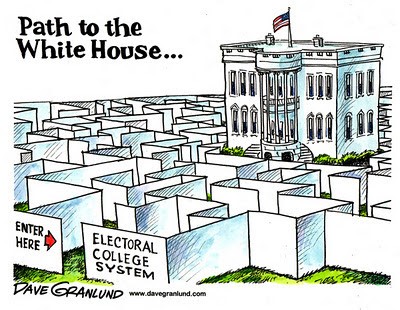
By Joel A. Harrison, PhD, MPH
January 19, 2017 (San Diego) -- Since the election, a lively debate has developed on the Electoral College.
In Federalist Paper No. 68, Alexander Hamilton promotes the Electoral College to ensure Presidents would have “the esteem and confidence of the whole Union, or of so considerable a portion of it as would be necessary.” Hamilton called it “unsafe to permit less than a majority of the states’ electors to select the president.”
If this were the only reason, a simple solution is to have an instant run-off where voters pick their first, second, and, perhaps, even third choice. If no one wins the majority, the two with the highest votes remain and voters who chose other candidates second choice are counted if for either of the two finalists. In addition, instant run-off would allow more people to vote for third party candidates without wasting their votes, sending a message to the victor of the sentiments of significant numbers of Americans.
However, there is a more fundamental problem with the Electoral College. According to the Records of the Federal Convention, Madison acknowledged that while a popular vote would be ideal, it would be difficult to get consensus on the proposal given the prevalence of slavery in the South: “There was one difficulty however of a serious nature attending an immediate choice by the people. The right of suffrage was much more diffusive in the Northern than the Southern States; and the latter could have no influence in the election on the score of Negroes.” The substitution of electors obviated this difficulty and seemed on the whole to be liable to the fewest objections.
In other words, a popular vote would be “unfair” because a sizable proportion of the population in Southern states were slaves who couldn’t vote. Thus, Madison was arguing that the Southern states would not have a force of electoral representation equal to their total population, as would be the case in Northern states.
The Three-Fifths Compromise addressed this issue, giving slave-holding states Representatives apportioned based on the number of whites plus 3/5th the number of slaves. Slaves, human beings with NO rights, who could be whipped, maimed, sold away from families, whose women could be raped, yes, raped, a slave can’t freely give permission, allowed the slave-holding states to far more Representatives than their eligible voters called for. In addition, the slave-holding states limited voting to a small oligarchy of upper class whites ensuring the continuous uncontested re-election of Representatives which, due to seniority rules, took the chair of most Congressional committees.
The result was that the oligarchical slave-holding states dominated American politics. In fact, Thomas Jefferson lost the election of 1800 if one only counted free white votes, Jefferson was, of course, a slave-holder. This minor glitch in our American democracy was “easily” changed, only costing 620,000 lives and an equal number crippled and maimed.
William Lloyd Garrison, founder and editor of the abolitionist newspaper “The Liberator,” called the Constitution a pact with the Devil. So, I would think long and hard about whether we should blindly accept the “wisdom” of our Founding Fathers considering Madison’s reasons for the Electoral College and the Three-Fifths Compromise. The horrendous number of casualties necessary to change the latter should give one pause.
Proponents of the Electoral College would like one to think that otherwise heavily populated states like California with large one-sided votes would dominate, that the smaller states would have little influence; but, for instance, in 2000 Bush won Florida by a whopping 537 votes. By giving all Florida’s electoral votes to Bush, almost half of the state’s electorate saw their votes as worthless. The Electoral College, as the past election made clear, allowed a few thousand people in each of a few states, to determine the outcome, not just ignoring the overwhelming votes in states such as California; but ignoring the close to 50% opposition votes in several states.
The US acts as a nation in international politics, international economics, and military policy. The President is the key figure in this, representing the American people, not the states.
The Constitution begins with “We the People.” The Electoral College is an anachronism from an era dominated by propertied white males, many who owned slaves. Despite the call for state’s rights, code for slavery in a bygone era, where prior to the Civil War we referred to ourselves as “The United States of America ARE”, following the Civil War, we began referring to ourselves as “The United States of America IS.”
Shouldn’t we finally abandon one of the remaining institutions based on this nation’s original sin of slavery and eliminate the Electoral College so that ALL votes, including the close to 50% totally discarded in several states, are counted in electing the one political office that represents “We the People?”
Joel A. Harrison, PhD, MPH, a native San Diegan, is a retired epidemiologist. Dr. Harrison has lived and studied in both Canada and Sweden. Dr. Harrison, a strong supporter of vaccinations, has, as a volunteer, been writing articles for Every Child by Two, a non-profit founded in 1991 to promote vaccinations in children. You can find his articles at: http://www.ecbt.org/index.php/facts_and_issues/article/expert_commentary
The opinions in this editorial reflect the views of the author and do not necessarily reflect the views of East County Magazine. To submit an editorial for consideration, contact editor@eastcountymagazine.org.








Comments
Give it your best try...